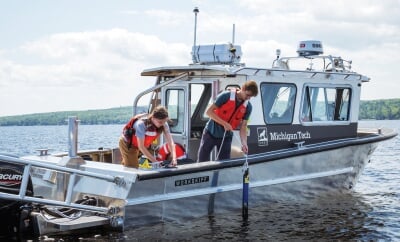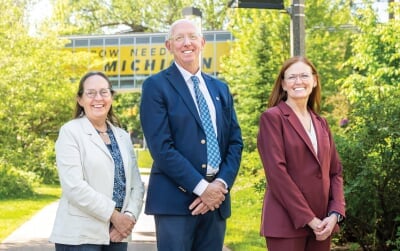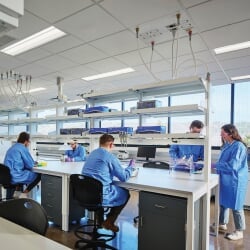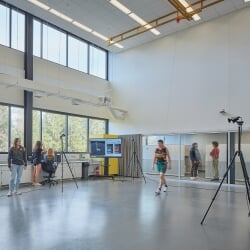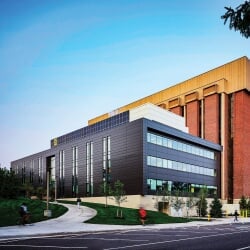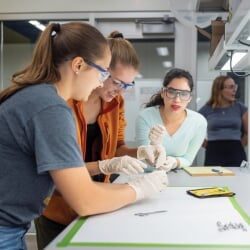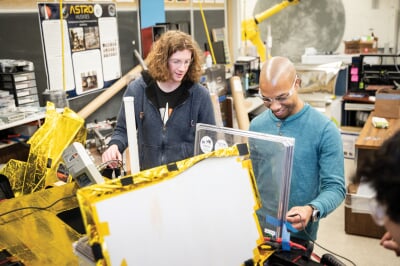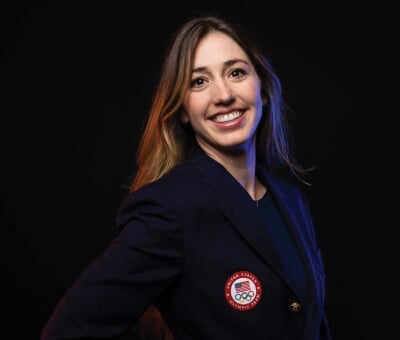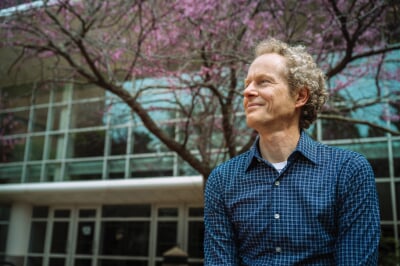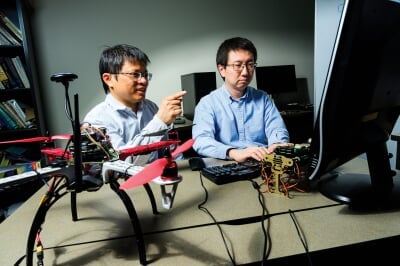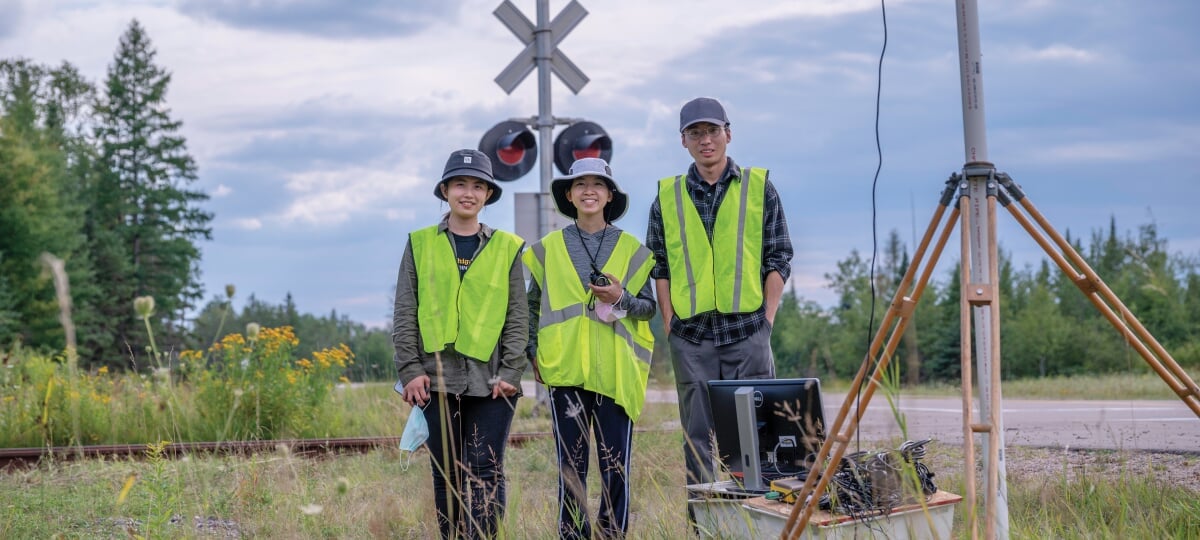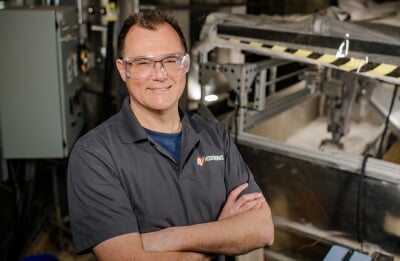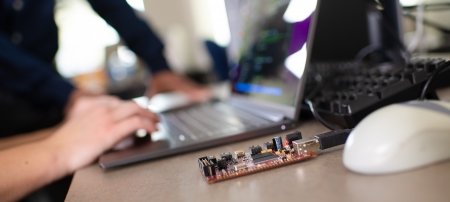New academic leaders. Passionate educators. World-class research. With an incredible crew of scholars, scientists, innovators, and entrepreneurs at the helm, Michigan Tech steps into our new R1 status as one of the nation's most elite research institutions.
RV Soliton
The Great Lakes Research Center (GLRC) welcomed RV Soliton to its fleet of marine assets last year. Built by Workskiff, the 26-foot workboat has a bare aluminum hull, a covered pilothouse, and two 150-horsepower outboard engines, which each have a fuel capacity of 150 gallons.
RV Soliton and the other vessels in the GLRC's fleet of marine assets allow Michigan Tech faculty, staff, and students direct access to Lake Superior. Both surface and subsurface assets are available for use by the Tech community and the University's collaborative partners on a shared basis. The fleet includes both crewed research vessels and autonomous surface and subsurface vessels.
Onward and Upward
Michigan Tech's overall number of students increased by 1.5 percent in fall 2024, totaling 7,430 Huskies and continuing our steady trend of measured enrollment growth. Tech currently has the largest student body seen on campus since 1982, and is edging closer to record highs set in the late '70s and early '80s.
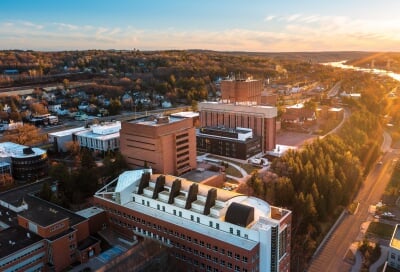
By focusing on purposeful growth, Tech is drawing talented students from across the nation and around the world, while maintaining the close-knit community and personalized educational experience the University is known for. Our undergraduate enrollment saw a significant boost, up by over 2 percent. The University also achieved our highest-ever student retention rate at 88.7 percent, reflecting our commitment to student success.
"I am enthusiastic about Michigan Tech's continued growth," said University President Rick Koubek. "It's a testament to the value our students place on a degree from Tech, which was recently affirmed by our ranking as Michigan's No. 1 public university for salary impact, according to The Wall Street Journal."
The journal ranked Michigan Tech as No. 3 for Best Salaries among public colleges in the US—the highest appearance of any Michigan college—and No. 15 among all colleges nationwide. The ranking was partly driven by the strong earning potential of Tech grads, who are seeing significant returns on their investment with a median early career salary of $80,300.
Andrew Storer, provost and senior vice president for academic affairs, said new academic programs at MTU are also playing a key role in driving steady enrollment growth—particularly in fields like health and technology.
"The H-STEM Engineering and Health Technologies Complex and the College of Computing exemplify how Michigan Tech is advancing interdisciplinary education and research, offering students hands-on opportunities that prepare them for the demands of tomorrow's industries," said Storer. "These initiatives not only attract a diverse group of students but also ensure they graduate ready to make a significant impact in their careers."
Trustees Approve New Home for Computing and Business
At its formal session in October, the Michigan Tech Board of Trustees approved the FY26 Five-Year State Capital Outlay Plan and FY26 Capital Project Request to be submitted to the State of Michigan. Included in their request: $30 million in state funding to support construction of the Center for Convergence and Innovation (CCI)—a $56 million project that will co-house the College of Computing and the College of Business.
The CCI will help position Michigan's economy as a leader in digital transformation through cutting-edge research, workforce development, and strategic partnerships. The CCI aligns closely with Michigan's Sixty by 30 goal of increasing the number of working-age adult residents with a skill certificate or college degree to 60 percent by 2030. The new campus building also supports the State's economic prosperity goals by supporting innovations in computing, connectivity, sensorization, and business in this new age of digital transformation, which is fueled in part by the rapid advances in artificial intelligence. The Michigan Department of Labor and Economic Opportunity expects significant increases in workforce demand for computer and mathematical operations, business and financial operations, and management—cumulatively generating over 58,000 projected new jobs in the state by 2030.
Enrollment has grown by 37 percent in the past five years in Michigan Tech's College of Computing, and by 38 percent in the College of Business. Together, the two colleges account for more than 77 percent of MTU's recent growth. Students and employees from the two colleges will intermingle in the new CCI to promote cross-disciplinary collaboration, innovation, and entrepreneurship. The building will feature reconfigurable makerspaces, shared digital lab facilities, student learning centers, open-access conference rooms, flexible collaboration spaces, and an entrepreneurship training hall. In addition to meeting Michigan Tech's own convergence needs, this building will facilitate continued aggressive growth in areas that will help the State of Michigan reach its goal of talent retention and attraction to ensure Michigan's future economic prosperity.
1 + 1 + 1 = 3 New Deans
Michigan Tech welcomed three new deans on July 1—all internationally known researchers who have addressed some of the most pressing contemporary issues affecting the planet.
Dean of the College of Engineering is Michelle Scherer, an environmental engineer whose specialty is soil and water chemistry. She came to Michigan Tech after a 26-year career at the University of Iowa, where she was a distinguished chair and professor in the Department of Civil and Environmental Engineering. She served as department chair for almost eight years, and served as the director of the College of Engineering's Hanson Center for Communication.
David Flaspohler leads the College of Forest Resources and Environmental Science (CFRES). His work in conservation biology focuses on the influence of human activities on natural ecosystems. Flaspohler's studies range from the effects of forest fragmentation on songbird populations to the cascading effects of deer overbrowsing and the influence of riparian forest management on birds, fish, and aquatic invertebrate communities. Flaspohler is a familiar face at Tech, having spent his entire career at the University and most recently serving as interim dean of CFRES for 21 months.
LaReesa Wolfenbarger is the dean of the College of Sciences and Arts. An expert on shorebirds of conservation concern and the ecological impacts of genetically engineering organisms, she came to Michigan Tech from the University of Nebraska Omaha, where she was associate dean of natural sciences and research in the College of Arts and Sciences. Prior to that appointment, she chaired the biology department. Wolfenbarger previously worked at the Environmental Protection Agency, which inspired her to shift her research trajectory to emphasize scientific collaborations and partnerships with policy and decision makers.
By the Numbers
-
$82,400median early career salary for graduates (PayScale's College Salary Report)
-
No. 3Best Public College in the US for High Salaries (The Wall Street Journal)
-
88.7%of first-year students returned for their second year (the highest retention rate in MTU history)
-
No. 9Best Career Placement Among Public Schools (The Princeton Review)
-
No. 1Best Value College in Michigan (Niche and SmartAsset)
-
No. 14Best Public College for Engineering in America (Niche)
H-STEM in Action
Michigan Tech's H-STEM Engineering and Health Technologies Complex, a new state-of-the-art facility built to advance interdisciplinary research and education in health-related STEM fields, opened its doors in March 2024. A bonafide campus showpiece, the H-STEM Complex puts research on display. One of its guiding design principles is that those within and outside the building are able to witness teams working together in shared, flexible, collaborative lab spaces—perhaps the most visual definition in MTU history of how interdisciplinary research works at the University. The H-STEM Complex is home to Michigan Tech's Health Research Institute, whose goal is to develop cutting-edge health technologies that save lives. HRI members conduct health-related research in areas like cancer biology, genetics, neuroscience, pharmaceutical design, and more.
Andrew Barnard Opens MTU's Next Chapter for Research
Andrew Barnard stepped into his new role as Michigan Tech's vice president for research on July 1 after the retirement of his predecessor, Dave Reed. He took the helm of Tech's research efforts after a two-year stint as director of Penn State's graduate program in acoustics.
Barnard is no stranger to Tech. He earned his bachelor's and master's degrees in mechanical engineering here in 2002 and 2004 before completing a PhD in acoustics at Penn State in 2010. In 2014, he returned to MTU as an educator, serving as an associate professor of mechanical engineering-engineering mechanics until 2022. During that time, he received the University's Distinguished Teaching Award and became director of the Great Lakes Research Center.
Barnard's tenure as vice president for research began as Michigan Tech celebrated a major research milestone: surpassing $100 million in research expenditures in 2023 for the first time in University history. He listed multiple reasons explaining why Tech has attracted such funding, and expects to see further increases in the University's future.
"Michigan Tech researchers consistently deliver high-impact research outcomes around the world," said Barnard. "Our University also has a unique and special connection to industry, which results in both direct funding and highly competitive joint proposals."
"I see Michigan Tech nearly doubling our research expenditures around 2030," he said.
"That will mean a more robust research support operation within the Vice President for Research Office, as well as larger and more recognized research centers and institutes. Michigan Tech will continue to grow research in our existing areas of excellence and will rapidly expand our focus on health sciences and engineering."
Michigan Tech's latest research milestone puts the University among the nation's best, brightest, and most respected: In February 2025, the University was formally named a Research 1 (R1) institution by the Carnegie Classification of Institutions of Higher Education. Tech is now one of only four R1 universities in Michigan, and one of only six public R1 institutions nationwide located in remote areas.
"R1 status is a reflection that we are already doing the right things at Michigan Tech," said Barnard. "Of course, it also comes with prestige and opportunities to compete for larger awards and partner with larger institutions. I hope R1 status will raise Michigan Tech's status nationwide and allow us to continue to recruit the best students, faculty, and staff from all over the world."
Ford Center Celebrates Improvements
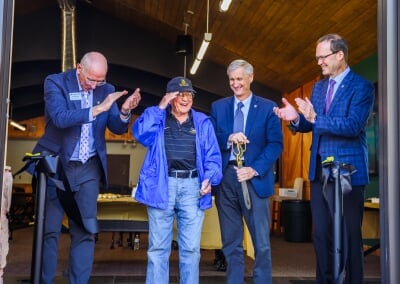
The last two years have brought facility improvements and increased support from alumni and friends to Michigan Tech's Ford Center and Forest. The beloved campus outpost in Alberta, Michigan, has operated as a field station supporting research and natural resources education for 70 years, since 1954. A ribbon-cutting ceremony October 1 unveiled the Ford Center's new meeting space—the Steve Danis Conference Room—and a new patio area featuring brick pavers engraved with names and memories of Husky alumni and friends. The expansion nearly doubles the size of the space and was made possible by donations. The lead gift for the project came from Lieutenant Colonel Stephen J. Danis '53.
NASA Finalists
In 2024, three teams of Michigan Tech students represented the University as finalists in NASA competitions intended to develop technology solutions to help establish a permanent human presence on the moon.
Astro-Huskies, a subteam of the Multiplanetary Innovation Enterprise (MINE) at Michigan Tech, competed in person in the final round of NASA's 2024 Lunabotics Challenge, held at the Kennedy Space Center in May. The annual challenge requires designing, building, and testing an autonomous construction robot that can travel through an obstacle area and perform a designated task. For 2024, the robots needed to construct berms from simulated lunar dust, or regolith. The team and their rover, STELLAR, advanced with one of the top 10 scores in the qualifying round.
Michigan Tech's Planetary Surface Technology Development Lab (PSTDL) was one of six finalist teams for the fourth and final round of NASA's Break the Ice Lunar Challenge. The students and their rover, PRIMROSE, traveled to Alabama in June for two days of live, head-to-head competition at the Alabama A&M Agribition Center in Huntsville.
PRIMROSE stands for Persistent Regolith In-situ Mining Remote Operated Surface Excavator. In the finals, Huskies piloted the rover through NASA's series of trials, consisting of an indoor excavation portion and an outdoor navigation and payload delivery portion—both with a time limit of one hour. Afterward, NASA recognized PRIMROSE as one of three rovers that performed exceptionally well in the excavation portion of the finals. Along with the two prize-winning teams, NASA awarded PSTDL students the opportunity to use the thermal vacuum chambers at its Marshall Space Flight Center to continue testing and development.
"I am very proud of the team's performance," said Paul van Susante, PSTDL director and the team's advisor. "The team worked well together to perform optimally during the competition. That includes the travel, the logistics, the hardware and software, the controls and MTU representation. Our rover, PRIMROSE, performed as designed during the competition in the excavation event and the transportation event. I am very happy with the result, and each and every student can be very proud of their accomplishments."
Another team of students from the PSTDL were set to prove their promising design for a lunar power management system to NASA engineers in the final round of the Watts on the Moon Challenge, held in July at NASA's Glenn Research Center in Cleveland, Ohio. To get there, the team won the top prize—the Artemis Award—in NASA's Breakthrough, Innovative and Game-changing (BIG) Idea Challenge in 2020, then expanded on and improved their original rover technology through three rounds of the Watts on the Moon Challenge. Unfortunately, Michigan Tech had to withdraw from the challenge's final round after technical difficulties caused them to miss the deadline.
Although the PSTDL team did not take part in the finals, team members demonstrated the functionality of their solution, TEMPEST—which stands for TEthered Mechanism for Persistent Energy Storage and Transmission—in Michigan Tech's own vacuum chamber.
50 Years of Women's Sports
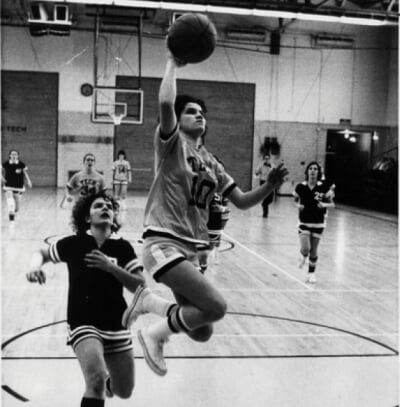
Throughout 2025, Michigan Tech Athletics is celebrating 50 years of women's sports with a list of 50 inspiring women who have excelled as student-athletes, coaches, and administrators at MTU since the summer of 1975, when women's sports officially became part of Michigan Tech Athletics. The University's inaugural women's varsity teams were basketball, volleyball, skiing, and tennis. Track and field followed in 1984, then cross country (1987), soccer (2010), and co-ed Esports (2019).
In the last 50 years, Huskies women's teams have won 34 conference championships, 38 female student-athletes have been named All-Americans, and countless alumnae have gone on to successful careers.
Women have become integral members of Michigan Tech Athletics, representing the University on the Huskies Pep Band, cheerleading team, dance team, and suiting up as mascots to bring Blizzard T. Husky to life. They have also enriched MTU sports programs in athletic training, sports information, equipment management, game operations, and ticketing.
Did You Know?
- In the 1950s and '60s, before varsity women's sports began, women competed in non-varsity sports like rifle shooting. Isabel Garity '57 and Jilann Brunett '64 are both members of the Michigan Tech Sports Hall of Fame for their marksmanship. Garity, known as "Michigan Tech's Annie Oakley," was the first female to earn an honorary varsity blanket at Michigan Tech, doing so in 1956. Brunett became the first woman elected to membership into Michigan Tech's Varsity Club.
- Cheryl A. DePuydt was the first full-time female staff member of Michigan Tech Athletics, serving as head coach of the first women's basketball and volleyball teams.
- Tech's women's basketball program has been a powerhouse in the Great Lakes region since the early '90s, racking up 25 conference championships and producing 14 All-Americans. The 2010-11 women's basketball team was the University's first and only non-Division I team to appear in a National Championship game in school history. The Huskies went 31-3 that season, led by All-American Lucy Dernovsek '11 and head coach Kim Cameron '05.
- Deedra Irwin '15, a three-sport student-athlete for the Huskies, represented Michigan Tech at the 2022 Winter Olympics in Beijing as a member of Team USA. She finished seventh in biathlon—the best finish in Team USA biathlon history.
Economic Analysis Delivered
A team of faculty, staff, and students from the College of Business (COB) and the Great Lakes Research Center completed an economic impact analysis of a proposed project to increase the depth of Menominee Harbor. Led by Assistant Professors Laura Connolly and Jenny Apriesnig and Research Engineer Travis White, the team delivered their results to the City of Menominee on March 15, 2024. Their study evaluated the project's range of possible economic impacts, highlighting both the potentially significant economic gains in the region if the harbor is deepened and considerable potential losses if the status quo is maintained.
Located at the mouth of the Menominee River between the cities of Menominee, Michigan, and Marinette, Wisconsin, the harbor has become shallower over time due to natural fluctuations and declining water levels. Currently, shipping vessels can't use the harbor while fully loaded due to the risk of running aground. This results in greater transportation costs and presents economic challenges for the Upper Peninsula and Northeast Wisconsin.
The City of Menominee is working with the US Army Corps of Engineers on an approximately $2.6 million feasibility study to evaluate the logistics of dredging the harbor to a depth that allows fully loaded commercial vessels to safely navigate the waterway. The city engaged the College of Business team to aid in the study—and Connolly, Apriesnig, and White recruited a six-member team of COB students to assist them.
"Economic impact studies are pretty approachable, compared to some other methods that we use," said Apriesnig. "Because of that, we were able to incorporate several students into the Menominee study. It gave them opportunities to do a lot of data visualization."
For some Huskies, the study was an inspiring first exposure to research. "It sparked an interest for some students to consider grad school and become more formally trained in research techniques and methods. It was a nice spillover effect," said Connolly.
Volcanology Student Awarded National Geographic Explorer Grant
Gustavo Bejar-Lopez, a geology PhD student at Michigan Tech, was just 30 days old when his parents brought him to visit a local volcano in his home country of Ecuador. Now, he's a volcanologist-in-training studying lahars—fast moving mixtures of volcanic debris and water that resemble mudflows or landslides—and the recipient of a prestigious National Geographic Explorer grant.
Bejar-Lopez recently embarked on an expedition funded by both the National Science Foundation and the National Geographic Society to the "perfect natural laboratory" of Guatemala's Volcan de Fuego. Alongside researchers from Michigan Tech and Boise State University, Bejar-Lopez was able to collaborate with an undergraduate student from Yachay Tech University in Ecuador, where Bejar-Lopez himself first began studying geology.
"As an undergraduate student in Yachay Tech University, I joined an expedition to find and collect fossils in the Peruvian Amazon thanks to another project funded by, coincidentally, both the National Science Foundation and the National Geographic Society," said Bejar-Lopez. "I wanted to generate the same impact on students through my National Geographic project."
Bejar-Lopez credits his Michigan Tech faculty mentors as key factors in the project's success.
"I started my involvement in the Fuego lahar project shortly before I officially joined MTU," he said. "Rudiger Escobar-Wolf, one of the co-principal investigators for this project, supported my research since the beginning and the involvement of Greg Waite as co-PI enabled me to develop skills in geophysics. I not only learned about volcanoes, which was cool in and of itself, but also earned valuable mentorship."
@michigantech: Through the Eyes of Today's Huskies
What's it like to be a Husky on campus in 2025? Current students share their experiences.
Favorite Class at Michigan Tech?
"Transducer theory. We designed and built some pretty sweet loud speakers out of scratch."
"Broomball class. It's a lot of fun and broomball is a large part of the Michigan Tech culture."
"My most interesting class was probably my ski and toboggan class over at Mont Ripley."
"The most interesting class I've taken is tropical island biology."
Shorts in the Winter: Yes or No?
"Shorts do not belong in the winter at Michigan Tech."
"Winter is the best part at Tech."
"It's 7 degrees out right now. I'm freezing my butt off. I'm just trying to get to my truck."
"It's my first winter. I'm actually suffering."
Why Did You Choose Your Major?
"My major is environmental engineering and I chose it because I love the Earth and I want to help it."
"I'm in MET (mechanical engineering technology) and I chose my major because I like to make what I draw and not stare at a computer all day."
"I chose chemical engineering because it was really hard in high school and I wanted the challenge."
"I'm a mechanical engineer because I'm good at math."
"I'm a medical laboratory science major and I chose my major because it gave me so many job opportunities."
Follow Michigan Tech to see more of what's going on in our campus community and get involved in the conversation.
Charles Wallace Named Michigan Distinguished Professor of the Year
In April, the Michigan Association of State Universities (MASU) presented Associate Professor Charles Wallace with the 2024 Michigan Distinguished Professor of the Year award. The award recognizes professors from Michigan's 15 public universities who are leaders in their field and passionately dedicated to undergraduate student success.
Wallace was nominated for the award by Michigan Tech in February for his significant impact on undergraduate student learning, particularly through classroom instruction, applied research, experiential learning, innovation, and mentoring. He joined Tech's Department of Computer Science in 2000, and also serves as the associate dean for curriculum and instruction in the College of Computing. He has been closely involved with undergraduate computer science curriculum development since he arrived at MTU. In addition, he co-founded the Bachelor of Science in Software Engineering degree program in 2003, and remains actively involved in student advising.
According to College of Computing Dean Dennis Livesay, both the breadth and the quality of Wallace's teaching efforts are worthy of statewide recognition. "Dr. Wallace's excellent teaching complements the many other efforts he is engaged in to improve curriculum and instruction in the College," he said.
Wallace's research is primarily in the areas of computing education, software usability, and ethics. His work is nationally recognized and supported by external funding, including from the National Science Foundation. In conjunction with his research, he founded local outreach efforts in computer education for middle and high school students and digital literacy for senior citizens.
Preserving History
In May, Michigan's State Historic Preservation Office awarded the 2024 Governor's Award for Historic Preservation to Michigan Tech's Department of Social Sciences, Geospatial Research Facility, and University Archives. The award honored their leadership efforts in the development of the Keweenaw Time Traveler, a digital online atlas of Michigan's Copper Country praised by state officials as a significant contribution to historic preservation efforts in the Keweenaw Peninsula.
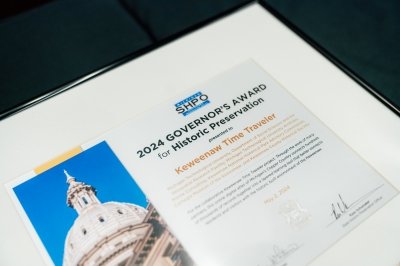
"The Governor's Award for Historic Preservation celebrates the collaborative spirit fueling MTU's Keweenaw Time Traveler project," said Don Lafreniere, the atlas's program director and a professor in the social sciences department. "We are very honored to have been recognized by the Michigan Economic Development Corporation and the State Historic Preservation Office for our work."
Researchers and students from the three MTU honorees led the project in collaboration with partners Monte Consulting, the Carnegie Museum of the Keweenaw, and the Keweenaw County Historical Society, who were also recognized by the award. Lafreniere said more than 45 other students, faculty, and staff from across Tech's campus were involved, working with local and regional partners and the general public to build the Keweenaw Time Traveler.
"The project has supported dozens of cultural initiatives and built heritage projects around the region and now is expanding to support other communities around the world who wish to protect, interpret, and promote the value of historical assets in their regions," he said.
"It's an honor to recognize this group of outstanding historic preservation achievements," said Lieutenant Governor Garlin Gilchrist II, who announced the award. "The honorees represent the rich diversity of our communities, our inclusive heritage and the welcoming culture that has long defined us in Michigan. Across our two peninsulas, these historic sites represent critical pieces of the fabric that makes us who we are as Michiganders."
Michigan Tech Research Award
Simon Carn, a world authority on satellite-powered analysis of global volcanic activity and a pioneer in its use, was named the winner of the 2024 Michigan Tech Research Award.
Carn, a distinguished professor in the College of Engineering's Department of Geological and Mining Engineering and Sciences, is described by colleagues as a world-class volcanologist best known for his work on volcanic gas emissions. His teaching experiences span the globe, from his volcanology course at Michigan Tech to a 2024 workshop on remote sensing for volcano monitoring in Rotorua, New Zealand. His work in emissions and his strong background in physical volcanology and magmatic processes make him a sought-after and trusted advisor for graduate students.
Michigan Tech also named Carn a 2024 University Professor, an honor that acknowledges his substantial contributions to Tech and his discipline.
"We're still a long way from being able to provide an accurate, long-range forecast of the next major eruption," said Carn. "But my work on volcanic gas emissions contributes both to the detection of eruption precursors, which potentially allow us to improve eruption forecasting, and to our understanding of the impacts of volcanic eruptions on the atmosphere and climate."
The Michigan Tech Research Award recognizes outstanding scholarly achievement by a faculty member and is awarded based on the impact of the person's research—particularly sustained research or a noteworthy breakthrough. The Michigan Tech Research Award is symbolic of the University's high standard for research endeavors.
Bhakta Rath Research Award
For their work to ensure that information on mainstream mobile devices can be stored securely and deleted permanently, Bo Chen, associate professor of computer science, and graduate student Niusen Chen were honored with Michigan Tech's 2024 Bhakta Rath Research Award.
With their team of collaborators, Bo Chen and Niusen Chen developed the first plausibly deniable encryption (PDE) capability for everyday computing devices. Going beyond straightforward data defense, PDE is a breakthrough that hides the data's existence, even in situations where the decryption key is leaked. International and domestic computer scientists nominated the pair for the award. Their letters noted PDE's significant security contributions and wide applicability, from safeguarding critical national security information to permanently deleting the personal data of billions of mobile device users. They credited Bo Chen and Niusen Chen with initiating "a new research direction for secure data deletion."
"PDE is employed to safeguard data throughout its lifecycle. On the other hand, secure deletion is crucial for eliminating outdated or no longer needed data, preventing unauthorized access after its useful life," said Niusen Chen. "Incorporating both strategies in modern computing devices is essential, as it addresses comprehensive data security challenges. This dual approach ensures that sensitive information is shielded both during active use and upon its disposal, thereby fortifying the overall data protection framework in today's digital environment."
The Bhakta Rath Research Award recognizes a doctoral student and their Michigan Tech faculty adviser. The award was established by Bhakta B. Rath and his wife, Sushama Rath, to recognize those who conduct exceptional scientific and technological research in anticipation of the future needs of the nation while supporting potential advances in emerging technology.
Penguins Pick Pietila
The Pittsburgh Penguins drafted Michigan Tech hockey second-year defenseman Chase Pietila in the fourth round of the 2024 NHL Draft, making him the first Husky to be selected after playing a season in the black and gold since Matt Roy in 2015.
As a first-year student-athlete, Pietila led the Huskies with 19 assists, ranking fourth in the CCHA and eighth nationally among rookie defensemen. He also led CCHA and NCAA rookies in penalty minutes while helping the Huskies win the Mason Cup and earn an appearance in the NCAA Tournament.
The Penguins have been actively involved in Pietila's development since the draft. He attended Pittsburgh's NHL Development Camp in July with his older brother Logan, a former Husky who signed an American Hockey League contract with the Penguins' Wilkes-Barre/Scranton farm team. Jason Spezza, the Penguins' assistant general manager, traveled to Houghton in October to watch Chase and the Huskies play, and another Penguins staffer later traveled to Houghton to lead Pietila in a workout. Other Penguins personnel attended the 2024 Great Lakes Invitational and other games throughout the season to keep tabs on their prized selection.
Pietila was named an alternate captain before his second-year season. He continued to be pivotal for the Huskies in the fall, logging more ice time than anyone else on the roster.
After being drafted in 2015, Roy left Michigan Tech after his 2016 junior season to sign his first NHL contract with the Los Angeles Kings. In December 2020, he completed his bachelor's in exercise science and received his MTU diploma. Roy recently signed a six-year, $34.5 million contract after seven seasons as a reliable NHL defenseman.
In March 2025, the Penguins signed Pietila to a three-year entry-level contract, ensuring that he'll still be wearing black and gold.
Nobody Who?
When Michigan Tech men's basketball head coach Josh Buettner scheduled an exhibition game against NCAA Division I University of Wisconsin-Green Bay for December 18, he knew he had a strong roster and a great chance to take down the Phoenix.
UWGB head coach Doug Gottlieb unintentionally set the stage, lamenting the late-December scheduling by Division I teams. In a press conference before the game, he questioned the value of playing nontraditional teams, using the term "Nobody U." Gottlieb may not have been directly referring to Michigan Tech as Nobody U, but the Division II Huskies entered the game with something to prove—and the talented squad left victorious, defeating the Phoenix 72-70.
Immediately after the win, the sports world took notice of Gottlieb's comment—and also of the Huskies. Social media traffic mentioning Tech surged across all platforms. Major sports shows touched on the game, and reporters from across the country wrote stories and columns about Gottlieb's comeuppance—and also Michigan Tech. Many described the University's remote location, challenging academics, and incredibly smart students, and also recognized the Huskies for the classy way they handled themselves after the victory.
"The good thing that's going on right now is educating people on what a special place Michigan Tech is," Buettner told the Detroit Free Press. "So that would probably be the biggest positive out of all of this."
Husky Nation already knew, but UWGB and many others across the country have now learned: Michigan Tech is Somebody U.
Rail Transportation Program Building Impact, Reputation
Coming out of the depths of the pandemic, Professor Pasi Lautala, director of Michigan Tech's Rail Transportation Program, saw what he describes as an explosion of growth—not only in interest from students and faculty, but also in the diversity of course offerings and research projects.
"If you take all the projects together across campus, we probably have about $8 million in rail research happening," said Lautala. "For a niche area like rail research, that's pretty significant."
Over a thousand students have enrolled in rail classes at Tech in the last 20 years, with 24 students earning the University's rail transportation minor since it was first offered in 2018, and another 16 current students have declared. Students have competed for nearly 200 scholarship opportunities and, along with program alumni, have secured nearly 500 internships and full-time jobs.
Faculty now leading active rail research projects include Lautala, Kuilin Zhang and Yousef Darestani from the Department of Civil, Environmental, and Geospatial Engineering; Jeremy Worm from the Department of Mechanical and Aerospace Engineering and APS Labs; Colin Brooks from the Michigan Tech Research Institute; Paul Sanders from the Department of Materials Science and Engineering; and Shane Mueller and Elizabeth Veinott from the Department of Psychology and Human Factors.
Adding to the program's accomplishments, Lautala was named co-director of education at the National University Rail Center of Excellence, which opened in May 2024. Led by and located at the University of Illinois Urbana-Champaign, the center is the first academic research and education center to be supported by the US Department of Transportation Federal Railroad Administration.
"Michigan Tech's Rail Transportation Program has earned credibility with the Federal Railroad Administration and other funders over the last 10 years or so," Lautala said. "We stay on budget, we stay on time, and we consistently deliver value in our work. This has built our reputation and helped further elevate Michigan Tech as an excellent university."
DoD Recognizes MTU for Excellence in Counterintelligence
Michigan Tech's Keweenaw Research Center (KRC) received the 2024 Jack Donnelly Award for Excellence in Counterintelligence, awarded annually by the Defense Counterintelligence and Security Agency of the US Department of Defense (DoD).
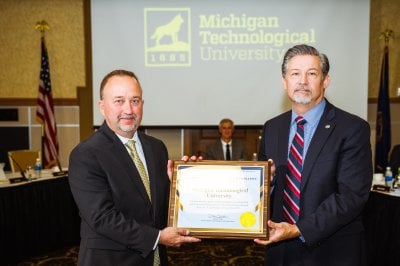
The Donnelly Award recognizes companies and institutions that best demonstrate the ability to stop foreign theft of US defense and national security technology. The KRC—a world-class multidisciplinary research center involved in military, industrial, and commercial vehicle applications research activities—was chosen as one of five recipients out of more than 10,000 eligible organizations in the nation.
"This award embodies the importance of academic contributions to security advancements," said Andrew Lochli, the agency's assistant director of counterintelligence and insider threat, who presented the award on campus in October. "MTU is recognized as a leader in risk mitigation and has built counterintelligence-focused culture in implementing processes within their program to detect, deter, mitigate, and expeditiously report suspicious contact activities through DCSA and other government agencies. They are so deserving of this award."
Andrew Barnard, vice president for research, emphasized the high priority Michigan Tech places on protecting the University's research. "This security function is vital to maintaining our national advantage in all areas of science and technology," he said. "The Donnelly Award recognizes the efforts of our research security professionals for their tireless work in counterintelligence. It also provides our federal and state partners assurance that at Michigan Tech, we will protect both our researchers and their data from foreign intelligence efforts."
"Protection of the research being conducted, the data generated, and the researchers themselves requires a collaborative effort and is a fundamental priority," said KRC Director Scott Bradley. "The Jack Donnelly Award is further affirmation of our long-standing efforts to protect the security of research conducted at KRC."
Excellence in Cyber Research, Cyber Defense
Michigan Tech now holds two designations from the US National Security Agency recognizing the University as a center of excellence in both cyber research and cyber defense. Tech was designated a National Center of Academic Excellence in Cyber Research by the NSA in May, and has held the National Center of Academic Excellence in Cyber Defense designation since March 2023.
"This is great recognition for the University, confirming our excellence in education and research and the quality of Michigan Tech's academic programs and its faculty," said Andrew Storer, provost and senior vice president for academic affairs. "It opens up exciting new opportunities."
Dennis Livesay, Dave House Dean of Computing, said the designations are a part of a University-wide effort to grow College of Computing cybersecurity research and degree programs, including the creation of an online Foundations of Cybersecurity graduate certificate.
"The CAE-R designation supports an environment in which students and researchers can share and collaborate and confirms Michigan Tech's readiness to make meaningful contributions to the nation's cyber defense," said Livesay. The designation recognizes Tech as meeting rigorous requirements set forth by the NSA and extends through the 2029-30 academic year.
"CAE-R designation gives us access to many federal cybersecurity research grants, boosts our national recognition and elevates our position in the cybersecurity research field," said Bo Chen, associate professor of computer science and chair of Tech's CAE-R designation committee. Leaders in cybersecurity from across the University were committee members, including Yu Cai, professor of applied computing; Jean Mayo, professor of computer science; and Chee-Wooi Ten, professor of electrical and computer engineering.
The CAE-CD designation lasts through the 2027-28 academic year, promoting and supporting quality academic programs of higher learning in order to grow the nation's cyber workforce, which ultimately helps ensure the nation is better prepared to defend against cyber threats and attacks.
"CAE-CD designated institutions are recognized as leaders in cybersecurity education and research, and graduates of CAE-CD programs are highly sought after by employers in the cybersecurity field," said Cai, who led the CAE-CD effort. "This recognition can help to attract students and faculty members, as well as funding and collaboration with government agencies and industry partners."
Dan Fuhrmann, chair of the Department of Applied Computing, said the CAE-CD designation distinguished Michigan Tech as one of 300 institutions in the country with high-quality academic programs in cybersecurity.
Paul van Susante Honored as ASCE Outstanding Technical Contributor
Paul van Susante, assistant professor of mechanical and aerospace engineering and Lou and Herbert Wacker Professor of Mechanical Engineering, was honored by the Aerospace Division of the American Society of Civil Engineers (ASCE) with the 2023 ASCE Outstanding Technical Contribution Award.
According to the ASCE, the award recognizes "an individual who has contributed substantially to advancing the state of the art in aerospace engineering, sciences and technology, and space exploration and construction with application to civil engineering." It is the highest level of honor offered by the Aerospace Division, and is given based on nominations from division committees and selection by its executive committee.
Van Susante is the director of Michigan Tech's Planetary Surface Technology Development Lab and advisor of the Multiplanetary Innovation Enterprise. He accepted the award in April 2024 at the ASCE Aerospace Division's Biennial International Conference on Engineering, Science, Construction and Operations in Challenging Environment, known as ASCE Earth & Space.
Tan Chen Receives Powe Junior Faculty Enhancement Award
Tan Chen, assistant professor of electrical and computer engineering, received a Ralph E. Powe Junior Faculty Enhancement Award from the Oak Ridge Associated Universities (ORAU) for the 2024-25 academic year. The competitive national honor is a one-year $5,000 seed grant aimed at enriching the research skills and professional growth of young faculty members.
Chen was one of only 37 assistant professors selected for the award out of a pool of 174 applications. He is the director of Michigan Tech's Robotics, Locomotion, and Applied Control Lab, and his investigations often involve complex dynamics and applied control of robots, such as legged robots and manipulators.
"My research focuses on robotics, control theory, and machine learning," said Chen. "I will use the award for the development of machine learning tools for modeling and control of large-scale dynamical systems."
Michigan Technological University is an R1 public research university founded in 1885 in Houghton, and is home to nearly 7,500 students from more than 60 countries around the world. Consistently ranked among the best universities in the country for return on investment, Michigan's flagship technological university offers more than 120 undergraduate and graduate degree programs in science and technology, engineering, computing, forestry, business, health professions, humanities, mathematics, social sciences, and the arts. The rural campus is situated just miles from Lake Superior in Michigan's Upper Peninsula, offering year-round opportunities for outdoor adventure.

